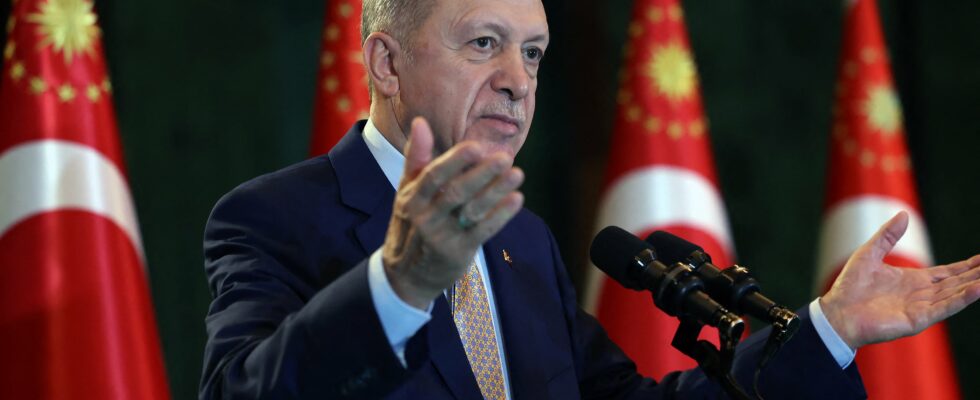In 1997, Recep Tayyip Erdogan, then mayor of Istanbul, recited, during a conference, an extract from a poem: “The mosques are our barracks, the domes our helmets, the minarets our bayonets and the faithful our soldiers.” At the time, Islamism in Turkey was experiencing a significant rise in power, in particular through the formation of Erdogan: Refah, or party of prosperity, anchored in a political Islam which called into question the secularism established by Mustafa Kemal Atatürk. It has attracted a large part of the population by offering a program based on Islamic values. The country has witnessed a real fight between Laïques and Islamists fantasizing about the return of the Caliphate. Two years later, Turkish justice decided to stop Erdogan, considering this recitation as an incentive to religious hatred. His imprisonment lasted four months and fed a victim speech among Islamists and their audience. This helped Erdogan, three years later, to create the Justice and Development Party (AKP), which reached power in 2002.
Today, the scenario is repeated, but in the opposite sense: the arrest of Ekrem Imamoglu, the mayor of Istanbul and opponent of Erdogan, a few days before the announcement of his candidacy for the presidential elections of 2028, sparked massive demonstrations against power. They reflect a Turkish current which despairs of Erdogan and dreams of a real democracy as a return to secularism, after having spent more than two decades under Islamist authority.
Sultan’s handling
Imamoglu is accused of financial corruption, collaboration with terrorist organizations and university degree falsification. These are classic reproaches used by any dictator to get rid of his political opponent. The day after his arrest, his training, the republican party of the people, appointed him as his candidate, thus launching a direct challenge to Erdogan. This decision was accompanied by the mobilization of hundreds of thousands of people throughout Turkey. Erdogan sought to destroy the reputation of Imamoglu, but his manipulation turned against him.
Especially since a large part of the Turks have lost confidence in their president. On the economic level, the unemployment rate remains high, at 8.6 %, while inflation amounts to 39.1 % since February. The government has implemented policies aimed at stabilizing the financial situation, in particular by considerably increasing interest rates. But these measures have slowed down economic growth, dropped to 2.5 %. Regarding freedom of expression, the situation of the press has deteriorated strongly. Turkish authorities require strict internet surveillance. Many media have been closed, such as the independent radio station Acık Radyo in 2024. The same year, according to Reporters Sans Frontières, Turkey was only 158th out of 180 countries in the World Press Freedom ranking.
Conspiracy accusations
To manipulate public opinion, Erdogan regularly accuses the West of supporting the opposition to destroy his country. It is the same conspiratorial accusation as Bashar el-Assad, qualified by Erdogan himself as a “butcher”, used against his political opponents in Syria. Faced with a blatant economic failure and criticism of his repressive policy, Erdogan presents himself as the restaurateur of the historic glory of the caliphate, of which his country would be the central pillar. “Turkey is the only country capable of leading the Islamic world,” he said in 2018 during his meeting with the Mufti of Türkiye. This policy continues: at the beginning of March, he sent his son Bilal to the Mosque des Omeyyads in Damascus, a major symbol for Sunni Muslims around the world. The latter supervised the replacement of the old carpets by others made in Türkiye. After the fall of Assad, Bilal, perceived in his entourage like the heir to the sultan, said: “The Omeyyad mosque is released, we are here for the Al-Aqsa mosque.”
Since the start of the demonstrations on March 19, the day of the arrest of Imamoglu, more than 2,000 people have been arrested, including journalists and political leaders. Faced with this brutal repression, the movement continues to grow. This recalls the Arab Spring, when violence has often not appeased disputes, but rather served as a spark triggering updates of greater intensity. And, just like in the Arab Spring, most of the demonstrators are young Turks who have known only one president: Erdogan. They aspire to a new face to direct their country.
Born in 1970, İmamoglu has a particular charisma and great popularity with youth. A graduate in business management at the University of Istanbul, he worked in the construction sector and was a football player during his university years. Today, he embodies the hope of a real political and secular change. After his arrest, the people’s republican party organized symbolic internal elections in Istanbul. Among about 15 million voters, more than 13 million, not affiliated with the party, voted in its favor. However, in a country where justice is not independent, Imamoglu risks a conviction which could prevent it from presenting itself in the next elections. The massive demonstrations of this weekend indicate that this will not mark the end of the movement, but rather the beginning of a long spring against the authoritarian regime in place.
*Writer and poet born in Damascus, Omar Youssef Souleimane participated in the demonstrations against the regime of Bashar el-Assad, but, tracked down by the secret services, had to flee Syria in 2012. He has just published The Arabic smiles (Flammarion).
.
